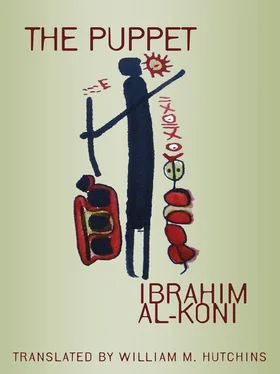Ibrahim al-Koni - The Puppet
Здесь есть возможность читать онлайн «Ibrahim al-Koni - The Puppet» весь текст электронной книги совершенно бесплатно (целиком полную версию без сокращений). В некоторых случаях можно слушать аудио, скачать через торрент в формате fb2 и присутствует краткое содержание. Год выпуска: 2015, Издательство: Center for Middle Eastern Studies, University of Texas, Жанр: Современная проза, на английском языке. Описание произведения, (предисловие) а так же отзывы посетителей доступны на портале библиотеки ЛибКат.
- Название:The Puppet
- Автор:
- Издательство:Center for Middle Eastern Studies, University of Texas
- Жанр:
- Год:2015
- ISBN:нет данных
- Рейтинг книги:3 / 5. Голосов: 1
-
Избранное:Добавить в избранное
- Отзывы:
-
Ваша оценка:
- 60
- 1
- 2
- 3
- 4
- 5
The Puppet: краткое содержание, описание и аннотация
Предлагаем к чтению аннотацию, описание, краткое содержание или предисловие (зависит от того, что написал сам автор книги «The Puppet»). Если вы не нашли необходимую информацию о книге — напишите в комментариях, мы постараемся отыскать её.
The Puppet — читать онлайн бесплатно полную книгу (весь текст) целиком
Ниже представлен текст книги, разбитый по страницам. Система сохранения места последней прочитанной страницы, позволяет с удобством читать онлайн бесплатно книгу «The Puppet», без необходимости каждый раз заново искать на чём Вы остановились. Поставьте закладку, и сможете в любой момент перейти на страницу, на которой закончили чтение.
Интервал:
Закладка:
She was floored by his tone and stood watching him rush off in the opposite direction, away from the throngs. He disappeared behind the buildings along the road that led to the fields. She told herself that she had never known a diviner, sorcerer, or any other individual involved with the occult who was not eccentric. She leaned over the bedcovers and then began to drag them to the courtyard to shake off the dust and to air them in the sunshine. She was humming an ancient tune she often relied on to revitalize herself and to energize her body. How delightful are melodies and how fine are lyrics that inflame sorrows! What would have happened to the desert and its people had they not inherited sorrowful poems from the mouths of their ancestors? What would have become of the desert and its people if the wasteland had lacked the antidote and the malady both called “yearning”? Yearning is the only secret that harbors its opposite within itself. It scorches the breasts of lovers with pains till they consider it a malady. When it dies in their hearts, the loss torments them and the privation slays them. Then they realize that it was an antidote. But God forbid that yearning be consumed without poetry’s flint stone to spark the fire! Poetry not only serves as a flint for longing’s fire; it is also the flint stone for everything in the desert. Were it not for poetry’s flint, the heart of a beautiful woman would never throb with passion. Were it not for poetry’s flint, thunder would not rumble in the sky to announce the thirsty earth’s inundation with rain. Were it not for poetry’s flint, real flint would not spark fire.
She remembered some funeral dirges.
The ghost of poetry cast her into the ocean of the epic that tribal poets had begun but not yet concluded. All poets have shared — just as warriors on fine camels all share in a race — in reciting an epic for eternity concerning thousandfold love. She had heard from neighbor women touching verses and from chatterboxes disturbing news about the conspiracy. They had said that the beloved woman’s death and her wretched true love’s beheading were not the end but the beginning of a catastrophe for the oasis. Their tongues had also relayed strange insinuations. From the prattle, her ears had plucked suggestions that the leader was in danger. Yes, the elderly neighbor woman, who spoke like a priest revealing a prophecy, had said that the leader. … But what relationship was there between old women’s gossip and the prophecy of the priest from the forestlands? Was it merely a coincidence that she heard today from the mouth of a forest priest — couched in allegorical language — the same information she had heard yesterday from a local priestess?
She cringed, cowering for a long time. Then she bolted for the door and raced through the alleyways toward the temple plaza.
4
Meanwhile, the specter was heroically battling the throngs as he attempted to reach the leader.
The congestion became even more intense near the foot of the mount adjacent to the sanctuary, because the herald’s cries had sparked curiosity in people’s souls. Groups poured out of houses, shops, markets, and even the fields. The vassals and guards who formed a protective buffer around the leader failed in their attempt to keep these groups at bay. People pressed his hands to congratulate him on his recovery. Some protested harsh taxes. Others deplored his attack on their treasures. Still other men declared their approval of the campaign and their hopes that he would keep up the good work. The specter fought bravely but the crowds proved stronger. Every time he pressed forward, arms shoved him back. Thus each time he thought he had advanced a few steps, he was actually a step further removed from his comrade.
The leader reached the temple door, and the circle around him became denser and more agitated. The specter made a heroic effort, but the common folk, who thought he was trying to get ahead of them to present a petition to the head of state before they could, were quick to treat him with a roughness not devoid of hatred. One of them whacked him with an elbow and another landed a fierce punch below his navel. So he screamed with pain.
Desperate, he shouted, but the clamor swallowed his cry. So he fell back on his final weapon and drew from his pocket a carefully folded piece of leather and waved it over the people’s heads, shouting to the leader, who finally noticed him — he thought. Perhaps he even recognized him, because the specter saw in his eyes the hint of a smile before he raised his hands to catch the leather sheet. He threw it to the leader, who caught it with both hands. He bent over it for an instant and would have spread it out to read had it not been for the crowd’s pressure. He folded it up and kept it in his hands. The specter screamed as loudly as he could, referring to the document, “Read it, master. Read!”
No one could tell whether this call, which resembled a cry for help, had reached the leader’s ears late that morning or if it had been drowned out by clamorous voices. Griots agree, however, that the whole crowd heard the final, grief-stricken call, for which the specter was only a conduit, because it could easily have been a heavenly revelation: “Master, you must read it now. You must read it before you enter that door!”
The leader, however, had disappeared through the door, and the guards formed an eternal barrier between him and the people.
The instant the leader disappeared into the temple, the maid arrived at a gallop.
5
Inside the oblation chamber, once he had chosen a place among his peers, he joked, “A council of nobles wouldn’t really be a council of nobles if the meeting weren’t held in an oblation chamber.”
Imaswan Wandarran exchanged a secret glance with the warrior. Amasis the Younger said in a strange voice, “You’re right. You’re doubly right.”
“It’s appropriate for us to slaughter a sacrificial animal in honor of the leader of the Law’s return after a lengthy absence from his sanctuary.”
The warrior said with unusual zeal, “We’ll slay a sacrificial animal for the Law’s advocate; our master can be sure of that.”
“But why don’t I see the council’s treasure at the center of the council?”
They exchanged looks fraught with meaning. The chief merchant said in a disparaging tone, “The ‘treasure of the council’ can’t sit up anymore. Our master should remember that the treasure is more than 140 years old.”
“We’ll visit him directly, tomorrow. If the council’s treasure doesn’t come to the council, the council must visit the council’s treasure.”
Silence prevailed. Outside, the people’s commotion mixed with the herald’s cry. The noblemen exchanged stealthy glances. The leader suggested, “We’d best begin.”
They responded, almost in unison, “We’d best begin.”
The hero drew an elegant dagger from his robe, pulled the blade from the scabbard, and began to rotate it in his hands. The leader protested, “I thought we agreed a long time ago to ban weapons from the sanctuary.”
There was a brief silence. Bodies trembled in anticipation. Then Ahallum replied with unusual coldness, “How does our master expect us to slay a sacrificial victim to honor the sanctuary’s authority if we don’t bring a dagger into the sanctuary?”
The leader glanced about curiously. A mocking smile flitted across the men’s eyes. The warrior gripped the dagger by its hilt and tested its fearsome edge with his fingers.
Turning to Imaswan Wandarran, he asked, “Comrade, do you remember what I told you about points of articulation? Would you like me to show you how to find them?”
Leaning over the dagger’s blade, he added coldly, “I told you that a man — like a sheep — has articulated joints and that you can’t kill him if you don’t understand them.”
Читать дальшеИнтервал:
Закладка:
Похожие книги на «The Puppet»
Представляем Вашему вниманию похожие книги на «The Puppet» списком для выбора. Мы отобрали схожую по названию и смыслу литературу в надежде предоставить читателям больше вариантов отыскать новые, интересные, ещё непрочитанные произведения.
Обсуждение, отзывы о книге «The Puppet» и просто собственные мнения читателей. Оставьте ваши комментарии, напишите, что Вы думаете о произведении, его смысле или главных героях. Укажите что конкретно понравилось, а что нет, и почему Вы так считаете.












